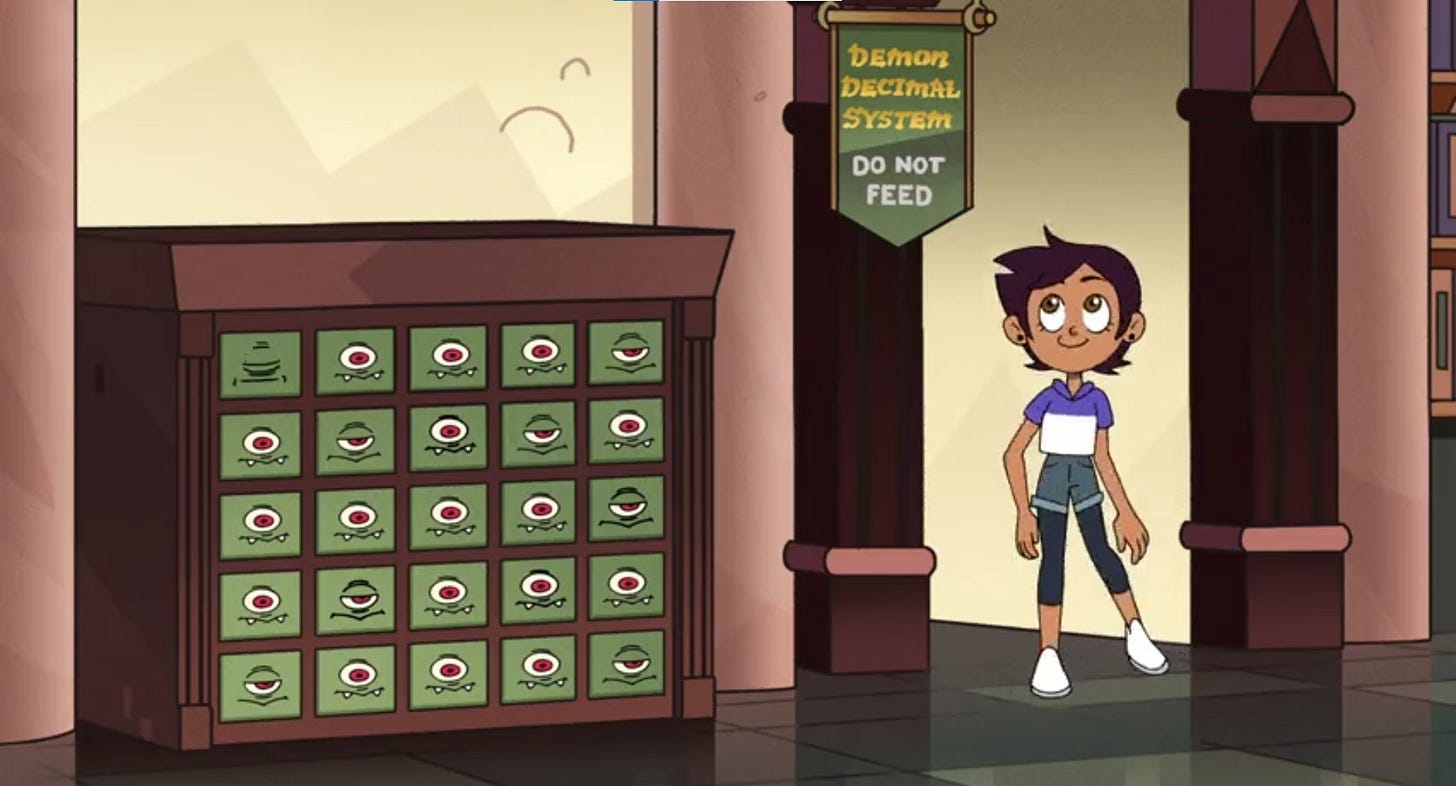Quiet libraries, fiction, CIA operations, the value of archives, family history, and Black origins in the Americas
There's a lot to talk about this week, so much that I'm going up to the email length limit. Anyway, happy Memorial Day!

Hello everyone! I hope you had a productive week and I wish you all a happy Memorial Day. Last Tuesday, I wrote about the quiet “sanctum” of a school library in Dear Brother, a 1990s anime, with one character complaining that libraries aren’t as quiet as they used to be, on my Libraries in Popular Culture blog. On Wednesday, my review of the series, City of Ghosts, was published on the Geekiary, the second post I’ve written on that review website up to this point. The same day, my friend published a new fictional work, which includes a section about libraries! In the work, my friend juxtaposes one of the protagonists, Elena, snoring in the library, which is called “one of the only quiet places in all Avalor, including in Avalor City, not bustling with people.” Not all libraries are quiet, as there has been a move, especially among public libraries, to make them community centers, which draw in people, who can be loud.
Anyway, I am excited that the collection of records I worked on for the National Security Archive, consisting of thousands of declassified memos from the last two years Rumsfeld was Defense Secretary, is available! Currently, I am working on a collection about CIA covert operations from 1953 to 1961, specifically on records from 1954-1957, with my other team members working on other years. In the next two years, I’ll be working with records about climate change, the Afghanistan War, Iraq, and nuclear nonproliferation from 1969 to 1977. So, that should be exciting. With that, let me move on to the rest of my newsletter.
A new issue of Archives Outlook was published earlier this month. Many archives issues are discussed within this publication. This includes the ever-important issue of archival compensation. In terms of attracting and connecting with patrons, there are articles about, for instance, donor relations and access, building an email campaign, assessing audiovisual materials, and most important of all, convincing those in the world, as a whole, that: archives continue to matter. In the latter article, Laura Millar, author of A Matter of Facts: The Value of Evidence in the Information Age, argues that laws and regulations should be modernized, use of technologies, tools, and social media ethical, spreading the message that records are valuable for history, justice, and equity, and continuing to inspire the public. She also says that archivists should be ready to talk to ANYONE about archives, having an elevator speech at the ready. I think this recommendation could put too much pressure on archivists themselves, who may be stressed out, overworked, have a terrible work environment, or some other issue. I don’t see a problem with archivists saying why archives are important, but they should decide when and where to do it, on their terms. She also calls for reaching out to other groups concerned about data management, misinformation, and social media companies, and other related actions.
Other articles focus on commemorating military casualties, preparing for the release of the 1950 U.S. Federal census, the value of liberatory memory work when it comes to archives, as argued by Michelle Caswell in her new book, Urgent Archives, which uncovers how “dominant western archival theories and practices are oppressive by design,” according to the book description. There were also articles focused on working apart, the 2021 SAA election results, and calls for archivists to continue a culture of giving, among many other topics. There is also a story about how users have trouble finding NARA records they are looking for, with the question of whether AI can help make records more accessible. In other NARA-related news, David Ferriero wrote about the value of acknowledging Indigenous history at the College Park facility, which was once the home of the Piscataway People. There were also stories about moving of British Parliament records to save historic documents, engaging in redescription as a way to reprocess existing records. At the Pennsylvania State University’s Eberly Family Special Collections, specifically the Luis Alberto Sánchez papers, there is currently working being done to “promote its accessibility and use through bilingual description and notes describing the papers’ curatorial history.” Just as important were the further Q&As with Heather Briston about third-party privacy, tribal and Indigenous records, along with Margot Note arguing that archival standards should be used in order to make data more exportable, and the poor record of the Library and National Archives, with a 1983 Canadian law strangling historical access.

That brings me to libraries. The Library of Congress had posts about cicadas, Memorial Day, re-opening four reading rooms (on May 20), native Hawaiian law, Asian-American printmakers and photographers at the library, and new rare books recently acquired by the library. Otherwise, there was an article I learned about thanks to a tweet from Violet Fox, about the invisibility Asian-Americans faced in the Dewey Decimal system from 1876 to 1996, which undoubtedly continued after that. There were articles also on various topics, such as, Indigenous literature, systems of surveillance built by library vendors, deconstructing power structures of libraries in order to imagine new futures, and libraries as “information fiduciaries.”
When it came to genealogy, there were some interesting articles and posts I came across. Some focused on Irish emigration, while others were about finding addresses and locations of ancestors, and the tip that you should always look at indexes of records, because you might be surprised what you find. Other scattered articles highlighted the value of remembering lost ones, researching family history, remembering Civil War ancestors, family names in France and Nouvelle-France from 1604-1759, and the April 2021 newsletter of Midwest Computer Genealogists. Also, Ancestry added new tags for “slave owner,” “free person of color,” and “enslaved person,” as I discovered on my own. However, you still can’t add in enslaved people as related to White people without going through “traditional” family structures. Nope. So, they really need to fix that, pronto.
That leads me to history. Smithsonian magazine is always strong in this area. This included Mexico City marking the 500th anniversary of the fall of Tenochtitlán on May 22, the story of L.A.’s Lowrider Car Clubs, a Louisiana museum remembering a yacht which trafficked enslaved Africans long after the slave trade was abolished, an Italian cave holding clues as to neanderthal life, and voices of women leaders in science, technology, and innovation. Jake Wynn, director of interpretation at the National Museum of Civil War Medicine, wrote about how one museum navigated the pandemic, while others wrote about the legacies of Quebec Act, the Continental Army in the Upper Ohio, the Harada House, and the first Africans entering the Americas, long before they were brought to Virginia in bondage. In the article on the latter subject, by Annette Gordon-Reed, a Black female historian who famously wrote about the Hemings family, Thomas Jefferson, and Monticello, with books like The Hemingses of Monticello: An American Family and On Juneteenth, she writes about this, noting:
…a “Negro” named Estebanico…traveled throughout what would become Texas. Estebanico’s journey across Texas as an interpreter for Cabeza de Vaca made him one of the first people of African descent to enter the historical record in the Americas. He was part of a cohort of African people who predated plantation slavery in the Americas, and had stories and legacies outside that institution…St. Augustine, Florida…[is] where race-based slavery, as an organized system, began on American soil, established by the Spanish as early as 1565. Enslaved and free African laborers helped build the settlement and its fortifications…Estebanico came to the Americas with the man who enslaved him, Andrés Dorantes, and Cabeza de Vaca, two of the leaders of a 300-person expedition to Florida and lands west.
I knew a little about this before reading her article, but it was still interesting nonetheless, as it makes clear that the arrival on August 20, 1619, of enslaved Africans to Jamestown, was not the beginning of Black history in the Americas, nor the “beginning of two and a half centuries of slavery in North America” as History.com incorrectly declares in their article on the subject. She rightly points out that experiences of other Black people and communities have been pushed away as U.S. history focuses “intensely on what happened within the boundaries of the British colonies, and on the perspective of English-speaking people,” not on those in colonies controlled by other European powers. She also notes that “people of African descent…occupy a special place in the narrative of the rise and fall of European nations in North America.” This is her third article in The Atlantic and I hope she writes more there.
There are some other subjects I’d like to discuss in this newsletter. For one, Smithsonian magazine noted that the X-Wing starfighter from Star Wars will soon be in the National Air and Space Museum and noted how algorithms discern our mood based on what we write online. I guess that algorithm can guess how I feel right now when writing this newsletter then, ha. Good luck with that, silly algorithm. Apart from a review of the final part of Theo Angelopoulos’ Trilogy of Silence, Landscape in the Mist (1988), there were, as always, wonderful illustrations from The Nib. They cover subjects such as the creepy new reality of smart devices, Mark Zuckerberg paying for an island in Hawaii, Jeff Bezos getting a new yacht, the hot summer for this year’s brood of cicadas, history being written by the victors (as lampooned by Tom Tomorrow), how banks ripped off Americans and destroyed Black wealth, the delusion of “inclusion” in the U.S. military, and a purse thief.
That’s all for this week! Hope you all have a productive week ahead!
- Burkely



